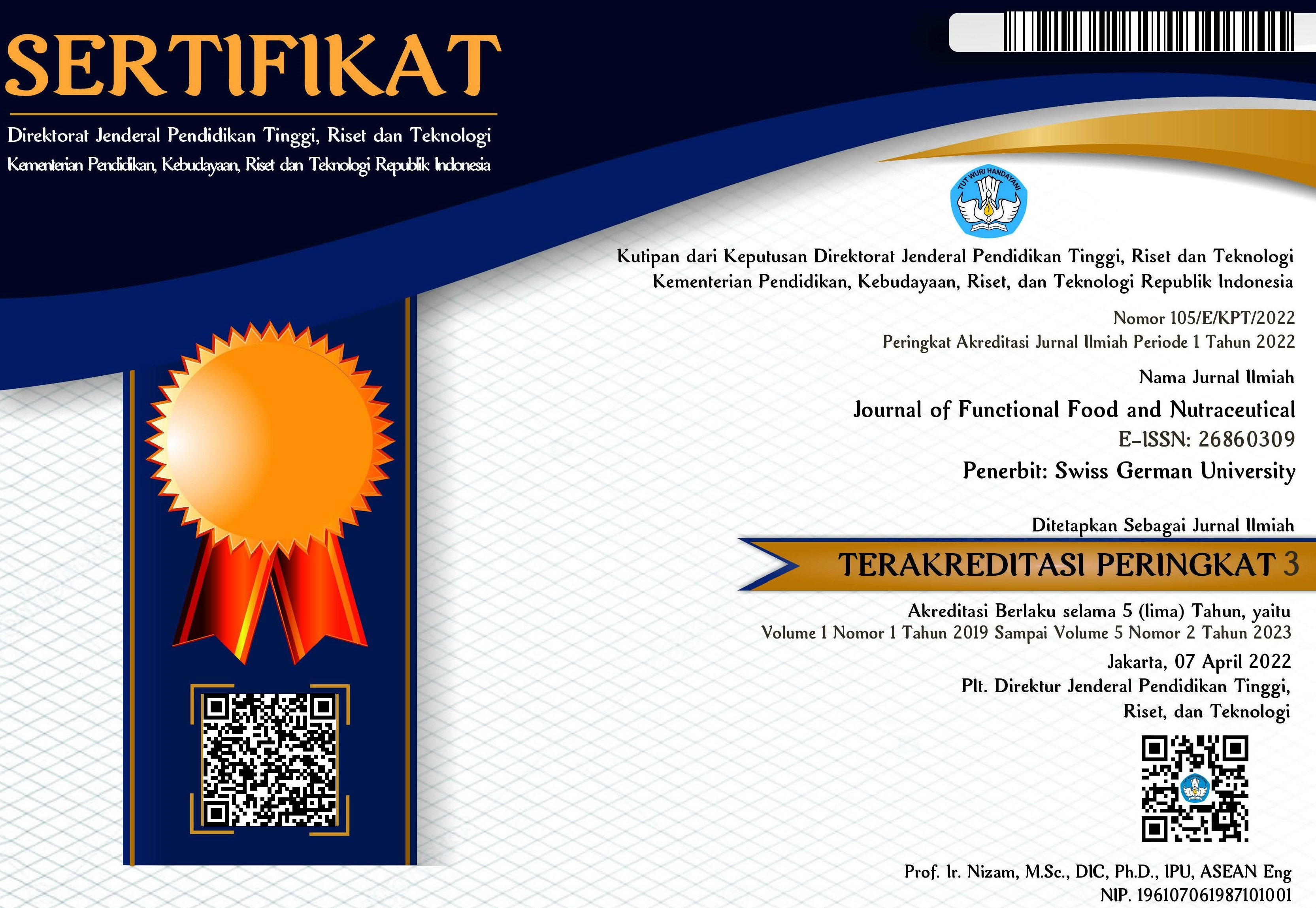Anti-inflammatory activity of pectic enzyme-treated pectin on lipopolysaccharide-induced RAW 264.7 cells
Abstract
The purpose of this study was to investigate the ability and pathway of the pectic enzyme-treated (PET) pectin to inhibit the inflammation of macrophage RAW 264.7 induced by lipopolysaccharide. Results showed that PET-pectin produced from 1% substrate and 48 h reaction time had the highest antioxidative activity, thus these parameters were used to produce PET-pectin used in this study. PET-pectin showed no cell cytotoxicity to normal macrophage RAW 264.7 and reduce the nitrite secretion from LPS-induced RAW 264.7 by 20%. Finally, the expression of cytokines, including NO synthase (iNOS), nitric oxide (NO), cyclooxygenase-2 (COX-2), nuclear factor kappa-light-chain-enhancer of activated B cells (NF-κB) and tumor necrosis factor (TNF-α) were analyzed by western blot. In the western blot method, it was found that iNOS, COX-2, NF-κB, TNF-α and other proteins that activated NO production had a downtrend. It was found that PET-pectin possess promising activity to mitigate the inflammatory response.
Downloads
Copyright (c) 2019 Journal of Functional Food and Nutraceutical

This work is licensed under a Creative Commons Attribution 4.0 International License.
All articles published by Journal of Functional Food and Nutraceutical are licensed under the Creative Commons Attribution 4.0 International License. This permits anyone to copy, redistribute, remix, transmit and adapt the work provided the original work and source is appropriately cited.
THIS PUBLISHING AGREEMENT (“Agreement”) is entered into by and between (“Journal of Functional Food and Nutraceutical”) and the Author(s) specified above (“Author(s)”) as of the Contract Date specified above.
WHEREAS, Research Center Food and Health Swiss German University is in the publishing journals and wishes to procure a license to publish the Author’s Manuscript,
WHEREAS, the Author(s) wish (es) to publish the Author(s) original work (“Manuscript”) in the Journal of Functional Food and Nutraceutical (JFFN).
NOW, THEREFORE, in light of the premises and the mutual promises contained herein, the receipt and sufficiency of which are hereby acknowledged, the parties agree as follows:
1. LICENSE TO PUBLISH
The Author(s) hereby grant(s) to Research Center Food and Health Swiss German University an exclusive, royalty-free, worldwide license to:
- publish, reproduce, store, distribute, transmit and communicate to the public, the Manuscript and any supplemental material in whole or in part, in print and/or digital form, whether or not in combination with the works of others, under The Copyright Law in Indonesia
- create adaptations, summaries or extracts of the Manuscript and any supplemental material or other derivative works based on the Manuscript and any supplemental material and exercise all of the rights in such adaptations, summaries, extracts and derivative works;
- include the Manuscript and any supplemental material, in whole or in part, in a computerized database and to make this database available to third parties;
- include the Manuscript and any supplemental material, in whole or in part, in a reader or compilation; and
- rent or lend the Manuscript and any supplemental material to third parties.
2. COPYRIGHT OWNERSHIP
2.1. Subject to the license grant in 1 above, the Author(s) shall retain all copyright rights held by the Author in the Manuscript.
2.2. This Agreement shall have no bearing on the moral rights of the Author(s) in the Manuscript, i.e. the right to be identified as the author and the right to object to derogatory treatment of the Manuscript.
2.3. Notwithstanding the copyright ownership set out in this clause, the Parties agree that third parties shall attribute the Journal of Functional Food and Nutraceutical and Research Center Food and Health Swiss German University when reproducing or otherwise using the Manuscript.
3. REPRESENTATIONS AND WARRANTIES
3.1 The Author(s) represent(s) and warrant(s) that:
3.1.1 The Manuscript is original and has not been published before in its current or a substantially similar form in another publication, i.e. the publication in Journal of Functional Food and Nutraceutical shall be the first publication of the Manuscript. For the avoidance of doubt, theses and manuscripts that have been presented with only abstracts at conference(s) do not qualify as “another publication”;
3.1.2 The tables, figures and images have not been previously published or adapted from previous publication without written permission from the original source unless a written permission has been obtained and is submitted to Journal of Functional Food and Nutraceutical;
3.1.3 The Manuscript is not under consideration for publication by another Publisher;
3.1.4 The Manuscript does not contain any unlawful statements or content and does not infringe any existing third-party copyright, moral right or other intellectual property rights;
3.1.5 The Manuscript does not contain any defamatory material, is not in violation of any rights of privacy or any other rights of third persons and does not violate any existing common law or statutory copyrights.
3.1.6 The Author(s) possess(es) all rights in the Manuscript necessary to grant the license set out in clause 1;
3.1.7 Where the Manuscripts reports on research involving human or non-human vertebrates, the research meets the highest reporting standards and has been approved by an institutional ethics committee;
3.1.8 “Proof of consent” has been obtained for studies of named organizations and people;
3.1.9 All Author(s) have received a final version of the Manuscript, have reviewed its content and agree(s) to its publication and the order of the Authors as listed;
3.1.10 Any person that has made a significant contribution to the research and the paper has been listed as an author and that minor contributors and works of others mentioned in the Manuscript have been appropriately attributed in the Manuscript;
3.1.11 The Author(s) has/have disclosed any potential conflict of interest in the research and that any support from a third party has been noted in the Acknowledgements.
3.2 The Author(s) will not deposit the final version of the Manuscript into a subject or institutional repository until the Manuscript has been published by Research Center Food and Health Swiss German University;
3.3 The Author(s) shall hold harmless and indemnify Research Center Food and Health Swiss German University from any third-party claims resulting from the publication of the Manuscript should there be a breach of the above warranty;
3.4 The Author(s) authorize(s) Research Center Food and Health Swiss German University to institute, in co-operation with the Author(s), the necessary steps to prevent third party infringement of the copyright in the Manuscript.
4. Obligation to Publish
4.1 The publication of the Manuscript by Research Center Food and Health Swiss German University is subject to the Final Acceptance of the Manuscript by Research Center Food and Health Swiss German University.
4.2 Subject to Final Acceptance, Research Center Food and Health Swiss German University undertakes to publish the Manuscript to the customary standard and at the expense of Research Center Food and Health Swiss German University within a reasonable period after Acceptance.
4.3 Notwithstanding Clause 4.2 above, Research Center Food and Health Swiss German University may charge the Author(s) for color printing, redrawing of figures resulting from substandard qualities of submitted figures and for substantial changes at the proof stage.
4.4 If the Manuscript is not accepted for publication by Research Center Food and Health Swiss German University the portions of the Agreement pertaining to publication of the Manuscript by Research Center Food and Health Swiss German University shall be null and void and the authors shall be free to submit and publish the Manuscript elsewhere.
5. GOVERNING LAW
5.1 This Agreement shall be interpreted and construed according to, and governed by the Indonesia’s law(s), as applicable, excluding any such laws that might direct the application of the laws of another jurisdiction;
5.2 Any controversy or claim arising out of or relating to this Agreement or the breach thereof, shall be settled by arbitration in accordance with the rules applied by the Badan Arbitrase Nasional Indonesia (BANI Arbitration Center).
6. MISCELLANEOUS
6.1 This Agreement constitutes the entire agreement of the parties and supersedes all prior communications, understandings and agreements relating to the subject matter hereof, whether oral or written. No modification or claimed waiver of any provision of this Agreement shall be valid except by written amendment signed by authorised representatives of Research Center Food and Health Swiss German University and the Author(s).
6.2 This Agreement and any amendments may be executed in one or more counterparts, each of which shall be deemed an original, but all of which together shall constitute one agreement.
6.3 Nothing contained herein shall be deemed to create an agency, joint venture, or partnership relationship between the parties.
6.4 Research Center Food and Health Swiss German University and the editors of the Journal of Functional Food and Nutraceutical accept no responsibility for statements made or opinions expressed in the Journal by authors.
6.5 Neither party shall be liable in damages or have the right to cancel this Agreement for any delay or default in performing hereunder if such delay or default is caused by conditions beyond its control including, but not limited to Acts of God, Government restrictions (including the denial or cancellation of any export or other necessary license), wars, insurrections, strikes, fires, floods, work stoppages, unavailability of materials, carriers or communications facilities, and/or any other cause beyond the reasonable control of the party whose performance is affected.
6.6 Waiver of any provision herein shall not be deemed to be a waiver of any other provision herein, nor shall waiver of any breach of this Agreement be construed as a continuing waiver of other breaches of the same or other provisions of this Agreement.
6.7 If any provision or provisions of this Agreement shall be held to be invalid, illegal, unenforceable or in conflict with the law of any jurisdiction, the validity, legality and enforceability of the remaining provisions shall not in any way be affected or impaired thereby.
6.8 The parties hereto agree to execute, acknowledge, and deliver all such further instruments, and to do all such other acts, as may be necessary or appropriate in order to carry out the intent and purposes of this Agreement.
6.9 Neither party may assign, directly or indirectly, all or part of its rights or obligations under this Agreement without the prior written consent of the other party, which consent shall not be unreasonably withheld or delayed.
6.10 The section and paragraph headings in this Agreement are inserted only as a matter of convenience and in no way define, govern, limit, modify or construe the scope or extent of the provisions of this Agreement to which they relate. Such headings are not part of this Agreement and shall not be given any legal effect.











